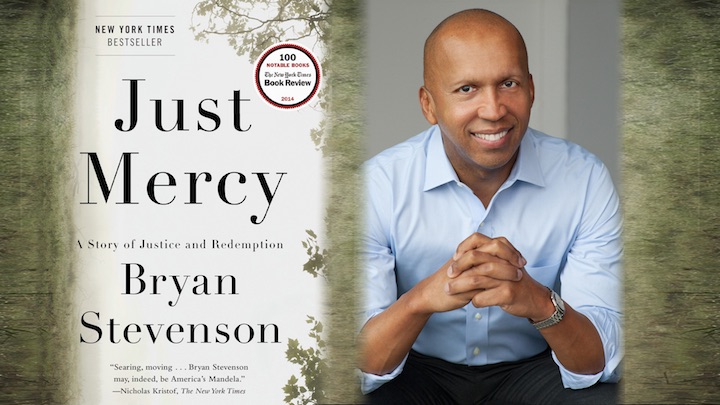Just Mercy: A Story of Justice and Redemption by Bryan Stevenson

Each of us is more than the worst thing we’ve ever done.
I first heard of Bryan Stevenson’s Just Mercy during Nonfiction November 2016, and then again during Nonfiction November 2017. Both JoAnn at Lakeside Musing and Lory at The Emerald City Book Review were so enthusiastic in their recommendations that the book quickly rose to the top of my “want-to-read” list. Now, after reading Just Mercy myself, I have to say it most definitely was as good as they said it would be.
Not only is it a compelling story well told, it is also a tremendously important book for America. Here’s how the publisher describes it:
Bryan Stevenson was a young lawyer when he founded the Equal Justice Initiative, a legal practice dedicated to defending those most desperate and in need: the poor, the wrongly condemned, and women and children trapped in the farthest reaches of our criminal justice system. One of his first cases was that of Walter McMillian, a young man who was sentenced to die for a notorious murder he insisted he didn’t commit. The case drew Bryan into a tangle of conspiracy, political machinations, and legal brinksmanship—and transformed his understanding of mercy and justice forever.
Just Mercy is at once an unforgettable account of an idealistic, gifted young lawyer’s coming of age, a moving window into the lives of those he has defended, and an inspiring argument for compassion in the pursuit of justice.
The stories in Stevenson’s book are truly heart-wrenching, and they challenge the reader to see criminals and the criminal justice system in an entirely new light. His book fits squarely within the Catholic Church’s call to do away with the death penalty and reform the justice system. Pope St. John Paul II, Popes Benedict and Francis, and the United States Conference of Catholic Bishops (USCCB) have all spoken a consistent message in recent years, to say nothing of the untiring work of Sr. Helen Prejean. Here’s just one example of the Church’s understanding of criminal justice from the USCCB that dovetails with the message of Stevenson’s Just Mercy:
Justice includes more than punishment. It must include mercy and restoration. A simplistic punitive approach to justice can leave victims of crime with feelings of neglect, abandonment and anger making reconciliation and healing difficult. A restorative justice approach is more comprehensive and addresses the needs of victims, the community and those responsible for causing harm through healing, education, rehabilitation and community support.
In their 2000 pastoral statement, Responsibility, Rehabilitation, and Restoration: A Catholic Perspective on Crime and Criminal Justice, the Bishops stated, “Just as God never abandons us, so too we must be in covenant with one another. We are all sinners, and our response to sin and failure should not be abandonment and despair, but rather justice, contrition, reparation, and return or reintegration of all into the community.”
Now compare that with a few quotes from Just Mercy:
The closer we get to mass incarceration and extreme levels of punishment, the more I believe it’s necessary to recognize that we all need mercy, we all need justice, and—perhaps—we all need some measure of unmerited grace.
the death penalty is not about whether people deserve to die for the crimes they commit. The real question of capital punishment in this country is, Do we deserve to kill?
…mercy is just when it is rooted in hopefulness and freely given. Mercy is most empowering, liberating, and transformative when it is directed at the undeserving.
Lent has just begun, and one of its purposes is to call us to metanoia, to change our hearts. Do yourself a favor this Lent and read Just Mercy. It will change your heart.
Just Mercy: A Story of Justice and Redemption by Bryan Stevenson
New York: Spiegel & Grau, 2014
Printed length: 368 pages
































This is a book I received in a nonfiction book swap, and still haven’t read, so this is a good reminder to bump it up in my list.
So glad you found this a worthwhile read! It’s been a couple of years and I still find myself thinking about it.